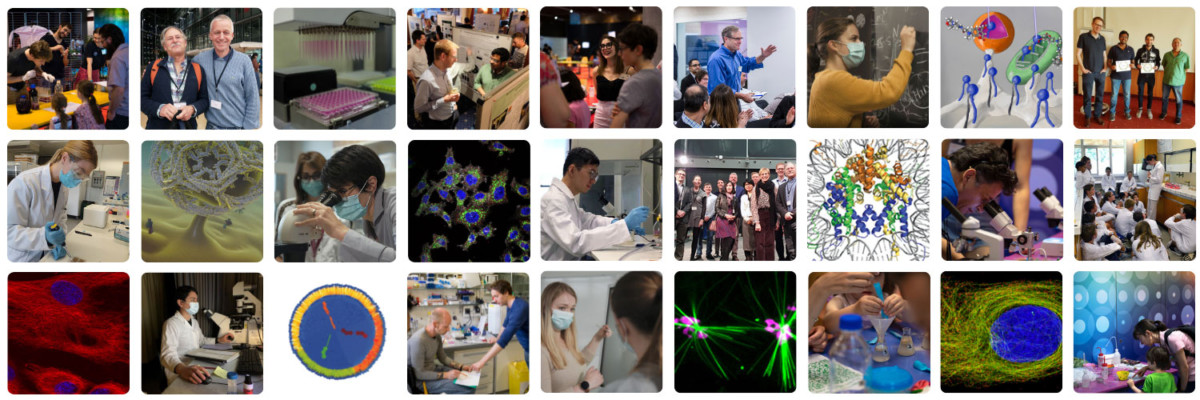The history of the SNE Chemical Biology association begins much earlier than the date of its creation. Indeed, the network is the direct heritage of one of the few National Centres of Competence in Research (NCCRs), an established federal funding instrument for top-level research on themes of strategic importance to Switzerland. NCCR Chemical Biology was a long-term research project standing for excellent and internationally recognised research, for knowledge and technology transfer, and for promoting equal opportunities and the careers of young researchers. Today, SNE Chemical Biology is there to capitalise on this 12-year legacy while at the same time carving its own path.
The NCCR (National Centre for Competence in Research) Chemical Biology was initiated and founded by Howard Riezman and Kai Johnsson in 2010. Their drive as the director and co-director of this NCCR and their relentless commitment to chemical biology in Switzerland led to a remarkable network.
Over twelve years, the NCCR Chemical Biology fundamentally changed the research landscape in the field in the Lemanic area. It remarkably bolstered chemical biology at the home institutions, University of Geneva and EPF Lausanne, by promoting interdisciplinary research, not only through collaborative projects, but also by recruitment and training of interdisciplinary scientists. A symbol of the open, collaborative, and interdisciplinary approach is the addition of physics to this collaborative effort, adding another dimension to the way biological questions can be addressed.
The NCCR Chemical Biology managed to establish a highly collaborative network, shaped by outstanding researchers and technology-driven, powered by technological innovation and the next generations of interdisciplinary scientists, in an open dialogue with society and the research community. The original goal was to visualize and control biology processes using chemistry. Significant progress was achieved on that direction, which led to seminal discoveries of important chemical tools and infrastructures, allowing investigation of biological questions that were previously impossible to address.
The NCCR Chemical Biology published nearly 700 original peer-reviewed papers that received major recognition and exemplify its scientific impact and multidisciplinary approach. The most illustrious and illustrative discovery has been the development of a new tool that has the potential to revolutionize research in mechanobiology. This tool, called Flipper-TR®, is able to insert into membranes and change its physical properties when the membrane changes its own. Flipper-TR® is commercially available so that the entire scientific community can use it.
The NCCR ran a strong effort to transfer its technology to biotechnological applications. Our research efforts permitted the creation of several startups with potential therapeutics and opportunities for technology transfer. The technology-driven platforms that were created or strengthened by the NCCR Chemical Biology still fulfill their important role for support of excellent research, fast progress, training and networking of researchers. As such, the screening facilities offered by BSF-ACCESS and ACCESS Geneva, and a platform for high-end proteomics services, are accessible today for researchers all over Switzerland and open to collaboration with academic and industry partners.
Many of the activities initiated during the NCCR impacted the community of other NCCRs and were adopted by them after the end of the NCCR Chemical Biology. Such was the Pre-seed workshop (Bench2Biz), that has filled an important gap in the entrepreneurial landscape in Switzerland by providing a tool for researchers in high technology to rapidly evaluate the translational potential of their discoveries.
The NCCR Chemical Biology was also very active on education, communication, and equal opportunities. Our communication was instrumental in developing not only a dynamic network of interdisciplinary researchers but also in establishing workshops on biochemical themes at the Chimiscope, the Faculty platform that brings chemistry and biochemistry closer to lay audiences or organizing memorable public events. The NCCR Chemical Biology applied a management policy including several approaches to increase junior researchers’ chances of success and promoted equality/equity. A tangible result in the gender equality area was the increase in the percentage of female professors in the network from 14% at the beginning to 33% at the end.
On the educational side, specific actions launched by the NCCR – such as our flagship interdisciplinary educational programme, including a Master programme in Chemical Biology, several online training courses, workshops, conferences, topical meetings – continue at an equivalent level under the leadership of the SNE Chemical Biology. They represent a key driver for the association and the catalyst for being a vibrant and dynamic community.

